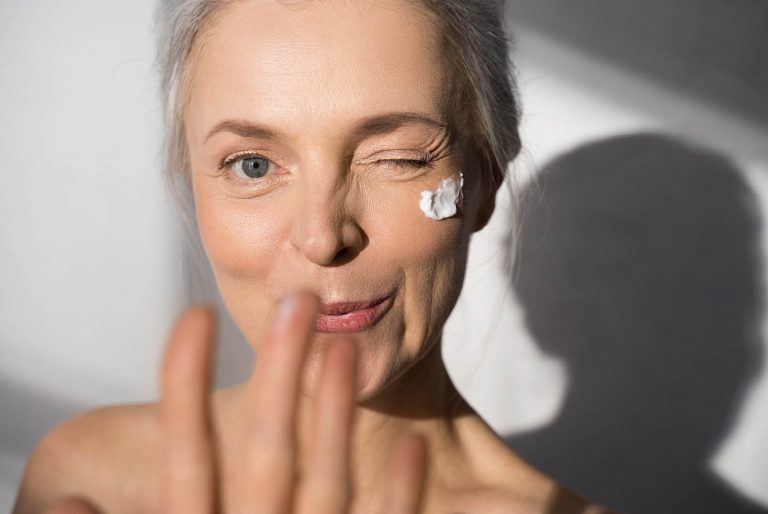As we age, our skin starts to undergo a series of transformations.
For one, thin, fine lines could become more prominent. Brown spots, saggy skin, and a drier appearance may also take away from the natural radiance and healthy look that we once had.
If you notice these characteristics in your skin, don’t despair just yet. Getting older doesn’t mean you have to consign yourself to a life of dull, lacklustre skin. With the right skincare routine and a few tweaks to your lifestyle, you can help minimise the signs of ageing and maintain an authentic and vibrant glow.
Here are six quick tips to help you achieve a glowing look in your 60s!
1) Limit Your Time Under The Sun
Do you enjoy basking in the sun during your free time? If so, make it a habit to apply sunscreen every day. And if you’re out the whole day, reapply your sunscreen every two hours!
If you’ve ever had a sunburn, you’re probably aware of the painful effects of prolonged exposure to ultraviolet (UV) rays. For those unaware, ultraviolet (UV) rays from the sun can damage your skin in 20 minutes.
Melanin—the pigment that acts as the outer layer of the skin—acts as a barrier against the sun’s rays. That said, it’s not infallible.
Prolonged exposure to the harsh rays of the sun can cause melanin to break down, leading to a host of skin problems like wrinkles, age spots, and skin cancer.
As such, don’t forget to smear some sunscreen every time you frolic in the sun. A sunscreen with an SPF of 30 or higher is ideal for the best protection against the sun’s scorching rays.
2) Exfoliate Regularly
Exfoliation helps you achieve a glowing complexion by removing dead skin cells that accumulate on your skin’s surface.
For more mature skin, it’s best to exfoliate once or twice a week using scrubs. Mature skin tends to be more delicate, so it’s best to keep your scrub or sponge extra gentle.
A konjac sponge can be the perfect tool for this. The natural, soft material of this Asian sponge provides a gentle texture that’s suitable for improving blood flow to the face and skin.
Lastly, be sure to use the exfoliating scrub before applying moisturiser, anti-ageing treatments, sunscreen, and makeup. This is so that the gentle acids in the scrub can penetrate your skin without any barrier.
3) Avoid Using Fragrances
Perfumes are a great way to make you smell nice, sure. But did you know that most perfumes contain chemicals that can dry out your skin?
This drying effect is more pronounced in aged skin, as the sebaceous glands that produce natural oils start to slow down with age.
As a result, using perfumes could lead to a host of skin problems like dryness, itchiness, and irritation.
So if you want to keep your skin healthy, refrain from using colognes, perfumes, and scented skincare products. Stick with natural products instead. your skin will be better off this way.
4) Hydrate Your Skin
Dry skin is one of the most common problems of the elderly. That said, hydrating your skin can help ensure that it stays supple and elastic.
One of the best ways to keep your skin hydrated is by having a humidifier in your room. This nifty device emits water vapour into the air, which then helps moisturise your skin as you sleep.
Another way to keep your skin hydrated is by using a fragrance-free moisturiser. This product can help lock in moisture and restore your skin’s protective abilities.
Also, when taking a bath, avoid using very hot water since this can strip away your skin’s natural oils. Instead, opt for a gentle lukewarm water bath. Don’t stay longer than 20 minutes in the tub, too, as any longer can also dry out your skin.
5) Eat Skin-Healthy Foods
What you eat is just as critical for your skin as what you put on it.
Load up on foods rich in antioxidants, like berries, leafy greens, and dark chocolate. These foods help to protect your skin against damage from free radicals, which are notorious for causing wrinkles and fine lines.
On the other hand, refrain from eating foods loaded with refined sugar, cholesterol, and saturated fats. These foods can contribute to inflammation, which leads to a plethora of skin problems that accelerate the ageing process.
Eating good food doesn’t only make you look good, it also makes you feel good. So if you’re serious about taking care of your skin, make sure to include plenty of skin-healthy foods in your diet.
6) Consider Clinical Treatments
If you’ve tried natural remedies and want an additional boost, clinical treatments are a viable alternative to speed up the process of getting radiant skin.
One popular skin treatment is liposuction, which can be performed on different areas of the body, including the neck. This treatment is available in many clinics like the Victorian Cosmetic Institute and is administered to patients who want to get rid of stubborn fat deposits in their skin.
Laser skin resurfacing is another popular treatment. This procedure uses high-energy lasers to improve the texture of your skin and reduce the appearance of wrinkles.
That said, dermatologists will still have to evaluate your skin condition before recommending any clinical treatment. This is to ensure that you’re a good candidate for the procedure and that it will provide the desired results. But if you’re qualified, then these treatments can be a fantastic way to achieve glowing, mature skin.




